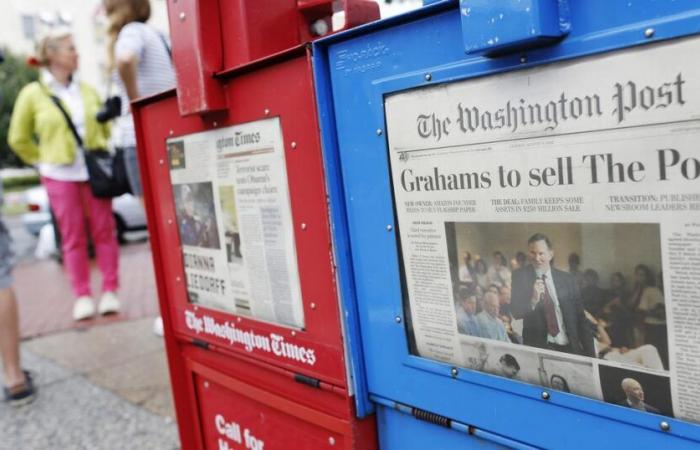In January, the Los Angeles Times is launching a tool to measure the bias of its articles using artificial intelligence. The measure, which is debated, highlights media strategies to anticipate the political and economic pressures expected with the return of Donald Trump to the White House.
At the beginning of December, the owner of the Los Angeles Times, Patrick Soon-Shiong, lifted the veil on a new tool that he wants to launch in January.
This “biasometer”, or bias calculator, will be integrated into news and especially opinion articles. Each reader will thus be able to “understand that the source of the article presents a certain level of bias”, affirmed the billionaire active in biotechnology. The newspaper’s management also wants to diversify the points of view in its columns.
This project immediately aroused the anger of the title’s editorial staff and its union, who criticize Patrick Soon-Shiong for publicly suggesting that his staff is biased, without providing evidence or examples. And the editorial team reminds us in passing of the rules of ethics that it respects: fairness, rigor, accuracy.
One columnist, Harry Litman, even resigned, accusing the management of “forcing the newspaper to adopt a position more favorable to Donald Trump”.
No presidential “endorsement”
The Californian title is not its first controversy. There have already been dismissals and resignations, notably when Patrick Soon-Shiong prevented the editorial staff from publishing his “endorsement” – his declaration of support – for Democratic candidate Kamala Harris.
The management of the Washington Post followed suit, also renouncing all support during the campaign, thus breaking with a long tradition, in the name of the independence of the title.
The media are preparing to face a very litigious and very litigious administration, which will attack several fundamentals of freedom of expression
Some see it more as an adaptation to Donald Trump and the threats he poses to the media. For Julien Labarre, lecturer in political science at California State University, these measures show that the media are preparing for the arrival on January 20 of the new tenant of the White House.
“I wouldn’t say that the media is giving in, but their resistance is a little more timid. They are preparing to face a very litigious and very litigious administration, which will attack several fundamentals of freedom of expression, for example the secrecy of sources, and possibly a form of definancing of the public broadcasting service”, notes the political scientist.
Strengthened legal centers
Media platforms are thus preparing for a form of legal harassment, “with abuse of procedure, untimely summonses”, details Julien Labarre. “Some chains give the impression that they are strengthening their legal department as much as possible, both in terms of staff and budget. It appears that significant funds are being set aside in preparation for abuse of process.”
The president-elect won a symbolic victory in mid-December against ABC News, which he accused of defamation. The network relented and will pay $15 million to settle the matter out of court.
Enough to encourage the Republican, who is already threatening similar lawsuits against other channels and newspapers.
We will find ourselves in a situation where the media will self-censor for fear of reprisals

The director of Reporters Without Borders in the United States, Clayton Weimers, calls on media companies not to give in. “In the case against ABC, most media law experts agree that Donald Trump would not have won his case by suing the channel for defamation. The Disney company, which owns ABC, n “simply didn’t see fit to fight to defend its news arm. This is a company’s business decision,” says Clayton Weimers.
Defend the First Amendment
But if all media companies decide it’s not worth defending the principles of the First Amendment, which protects freedom of the press, the situation will quickly become problematic, the official warns. “This will mean that any politician can simply threaten a media outlet into capitulating, and we will find ourselves in a situation where media outlets will self-censor for fear of reprisals.”
Reporters Without Borders has issued recommendations to Donald Trump to bridge the gap between him and the media, in particular by recognizing their role in the proper functioning of democracy, or by taking action to free journalists imprisoned outside the United States. United.
Julie Rausis








